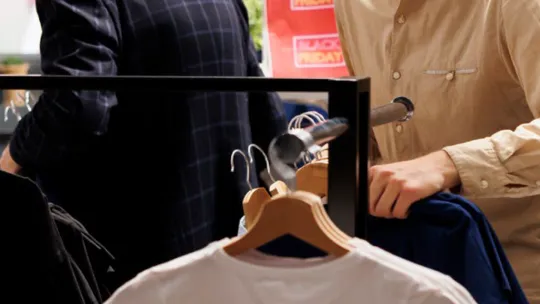
OBS Report: Black Friday 2025
Spain ranks fifth in the world in Black Friday sales

- Black Friday now accounts for 66% of sales until the end of the year.
- Spain generates 6.3% of global sales.
- This year, each Spaniard will spend €210, although they will be more cautious about prices.
- Clothing, gifts and technology are the most sought-after items, but sales of cosmetics and toys are on the rise.
- Amazon, Ikea and El Corte Inglés are the top online sellers. Decathlon is the leader in clothing, followed by Zara.
- Mobile payments continue to increase.
- A report by OBS Business School warns of the need for a well-trained workforce with unwavering resilience to manage the huge sales during this period.
November 2025. OBS Business School, an institution belonging to the Planeta Formación y Universidades higher education network, publishes the Black Friday 2025 report led by Professor Eduardo Irastorza, which analyses consumer trends and forecasts on a date that sees increasingly high sales and which for many marks the start of their Christmas shopping. What began many decades ago as local sales in the United States with the aim of clearing stock after Thanksgiving has become a key date in the commercial calendar of any sector. An event capable of competing even with the most important date in the commercial and cultural calendar: New Year's celebrations.
Black Friday and Cyber Monday account for no less than 66% of sales between October and the end of the year.
Clothing, gifts and technology
This year, each Spaniard is expected to spend a not inconsiderable €210 on Black Friday, making 2025 one of the fastest-growing years. Clothing, gifts and technology continue to be the most sought-after items by consumers, but there has been an increase in the purchase of cosmetics and toys, indicating that many are getting their Christmas shopping done early.
Online sales are undoubtedly the fastest growing year after year. The United States is by far the country with the highest proportion of purchases made online at this time of year, accounting for up to 21.2% of the global total. Behind it are Germany, Brazil and the United Kingdom, with Spain in fifth place, generating 6.3% of worldwide sales with sustained growth over the last three years. The absence of China in this ranking is striking, as this powerful country does not celebrate Black Friday, which is good proof that cultural differences remain. However, curiously, non-Western nations account for an increasing share of the total percentage of trade on this date, a proportion that continues to grow.
Amazon is the king of sales worldwide, including in Spain. It’s almost infinite range, as well as the quality and security of its service, propel it to the top spot. In second place is Sweden's IKEA, determined to redecorate our lives at the end of the year. And third place goes to El Corte Inglés, although without much advantage over much less diversified competitors.
Technology is one of the stars of Black Friday and its sequel, Cyber Monday. Within this category, the Nintendo console practically doubles the sales of the other most coveted item, the Apple iPhone, followed by another product from this brand, the iPad. Basically, video game consoles and mobile phones account for the vast majority of sales, but virtual reality glasses will undoubtedly be a major player this year.
Decathlon sells the most clothing during Spanish Black Friday. The sports brand has expanded its fashion offering beyond sportswear to such an extent that it has become one of the three retailers with the highest turnover throughout the year. Zara ranks second, followed by Adidas and Nike.
A Black Friday for all ages
The younger generations satisfy their consumerist desires at this time of year from a very early age; older people have lost their fear of shopping online and also find it a good excuse to go out and about. In both cases, low budgets are not a problem, because Black Friday is no longer segmented by age, but also by purchasing power. And no sector is left out, even the financial sector is thinking of promoting consumer credit at this time of year.
A more restrained buyer
At a time when the world is on the brink of recession, gripped by mistrust in the markets, slowed down by investments and with an economic and geopolitical future that is more than uncertain, this year consumers will look much more closely at the price before buying or simply give up on having the latest and greatest, which is always more expensive. Many will bring forward their Christmas shopping and store their gifts at the back of the wardrobe until Christmas Eve. In fact, everything suggests that both celebrations will end up merging and being redefined and reclassified because, whether we like it or not, the secular calendar prevails over the religious one in the commercial sphere.
Mobile payments continue to gain market share over traditional credit cards. However, the OBS report warns that caution should be exercised when shopping online, as cybercriminals are becoming increasingly sophisticated in their techniques for defrauding buyers. A report by Kaspersky indicates that digital fraud grew by 34% on Black Friday between 2023 and 2024. Fake store pages and unrealistic discounts, identity theft through emails and messages, fake raffles and fraud related to payment platforms are proliferating.
The challenge of managing sales
Today, a huge technological apparatus is responsible for ensuring the efficient management of the entire value chain, from production to delivery. And efficient management means the best product or service, completely personalised, at the best price, with mathematical precision in delivery times and, in return, the highest degree of customer satisfaction, which translates into loyalty over time.
Buyers want their products immediately, and the younger they are, the less they are willing to wait. Delivery times must be strictly adhered to, or companies risk receiving negative reviews from dissatisfied customers. This may be the Achilles heel of retail and distribution giants such as Amazon, which cannot cover the delivery of millions of items with their own fleet of vehicles. That is why ‘Black Friday increasingly requires a trained workforce with unfailing resilience,’ says Professor Eduardo Irastorza. It is no longer enough to hire part-time staff with a few guidelines at best. Handlers, stockers, warehouse workers, installers and customer service staff need to be fully trained on the product range and be able to take on the role of advisors. ‘As brands understand that these people are the ones who maintain real contact with the customer, they will be in a position to offer a comprehensive consumer experience,’ adds Irastorza.
No other commercial milestone throughout the year requires greater effort, more concentration and a larger volume in less time than Black Friday. The factor that makes this possible with such remarkable results is undoubtedly the use of powerful CRM and artificial intelligence tools from Microsoft, Salesforce, Oracle and many other giants in the tech sector. Business spending on these types of solutions is increasing worldwide and across all sectors. In reality, there is no alternative to investing in them if brands want to be on board the technological train of the future. And with social media as a vital tool for preparing in advance for this event, even for smaller brands.



